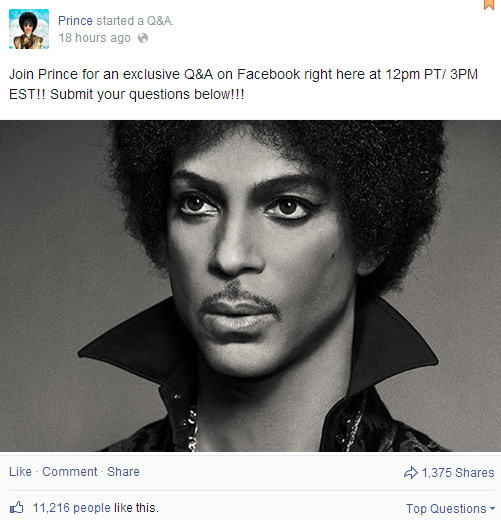Minnesota is agog over Prince again, thanks to the release of two new album, and the cult that he heads.
Take his “exclusive” question-and-answer session on Facebook yesterday, for example.
Almost 4,000 people took the bait and submitted questions. Prince answered one — and he didn’t even really bother doing that.
A fan asked him to “address the importance of ALL music being tuned to 432hz sound frequencies.”
He posted a link. Nothing else.
And that was that. Thanks for coming, everybody!
“At the very least, he could have given us a look inside his fridge before returning to his weekly Tuesday marathon of New Girl,” Consequence of Sound said.
Not too surprising. Prince hates the Web and has succeeded in wiping most of his music off it, something that normally would rile anyone under, say, 50.
Says the Washington Post today.
In recent years, he’s managed to pluck nearly all of his music off YouTube, earning him a reputation for being Web-phobic and out of touch. But it’s important to remember that Prince, now 56, began experimenting with self-distribution and give-away album releases long before it was fashionable – and before it was so eagerly sponsored by titans of telecom and consumer electronics. Ten years ago, Prince’s sales spiked when he included a copy of his latest album, “Musicology,” in the price of a concert ticket. And that album was pretty good, too.
Still, His Purpleness never managed to establish a sustainable business model and has recently re-signed with Warner Bros., the label that first launched his career. Their break-up in the ’90s was more historic for its ugliness, causing Prince to change his name to a symbol and scrawling the word “slave” on his face in guy-liner. Now, the major artist and his major label are back together and everything appears to be peachy.
The New Yorker loves one of the new albums, calling it — you’ll love this — “coherent.”
In the past few years, the Prince songs that leaked online seemed to be less about paving the way for a new album and more about trolling the Internet. “Breakfast Can Wait,” a lithe and light funk number, was released with a cover photo of Dave Chappelle as Prince. Only a snippet of “This Could Be Us” leaked, but it was enough to confirm that Prince had written a song about a popular Internet meme that used a picture of him from his “Purple Rain” days. As proper singles started appearing, though, the album came into sharper focus. Songs like “Clouds” and “U Know,” slower and more repetitive than the kaleidoscopic funk-rock we’ve come to expect from Prince, suggested a new direction—a kind of gelatinous, futuristic R. & B.
These tracks worked in concert with the other singles to sketch out a theme: that technology separates us from those we’re close to, and even from ourselves; and that the lack of integration may well result in disintegration. “Clouds,” the second track on the album, which opens with the sound of a radio tuning, critiques the way the computer age offloads experiences to distant servers (that’s what the clouds are); the song instead prioritizes romance and human connection (“You should never underestimate the power of a kiss on the neck when she doesn’t expect a kiss on the neck”). It also folds in a well-constructed argument about the way the Internet era has encouraged empty exhibition and a half-baked argument about violence and bullying, before ending with a sci-fi monologue delivered by a British female voice that seems to suggest that Prince has been placed in some sort of centuries-long suspended animation.

